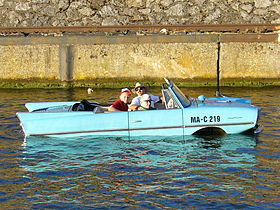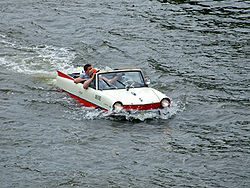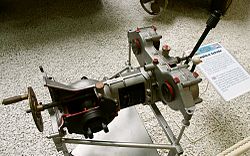Amphicar
| Amphicar Model 770 | |
|---|---|
 Amphicar Model 770 photographed in Stuttgart 2005 | |
| Overview | |
| Manufacturer | Quandt Group |
| Production | 1961-1968 4,000 built |
| Designer | Hanns Trippel |
| Body and chassis | |
| Body style | two door cabriolet with boat features |
| Layout | RR layout |
| Powertrain | |
| Engine | 1147 cc straight-4 (Triumph) |
| Transmission | 4-speed all-synchromesh manual |
| Dimensions | |
| Wheelbase | 84 in (2,134 mm)[1] |
| Length | 171 in (4,343 mm) |
| Width | 62 in (1,575 mm) |
| Height | 60 in (1,524 mm) |
| Curb weight | 2,324 lb (1,054 kg) |





The Amphicar Model 770 is an amphibious automobile, launched at the 1961 New York Auto Show,[2] manufactured in West Germany and marketed in the United States from 1961-1967, with production having ended in 1965.
Designed by Hanns Trippel, the amphibious vehicle was manufactured by the Quandt Group at Lübeck and at Berlin-Borsigwalde, with a total of 3,878[2] manufactured in a single generation.
A descendant of the Volkswagen Schwimmwagen,[3] the Amphicar offered only modest performance compared to most contemporary boats or cars, featured navigation lights and flag as mandated by Coast Guard — and after operation in water, required greasing at 13 points, one of which required removal of the rear seat.[2]
The Amphicar name is a portmanteau of "amphibious" and "car".
Product description (1966 Amphicar Model 770)
Engine: Triumph four-cylinder engine of 1147 cc, 8.0 compression ratio, rated at 38.3 bhp
Chassis/body
| Overall length | 14.250 ft (4.343 m) |
| Overall width | 5.083 ft (1.549 m) |
| Height | 5.000 ft (1.524 m) |
| Turning circle | 36.833 ft (9.398 m) |
| Wheelbase | 7.000 ft (2.134 m) |
| Front track | 4.000 ft (1.219 m) |
| Rear track | 4.083 ft (1.245 m) |
| Fuel tank capacity | 10.5 imperial gallons (13.125 U.S. gallons; 49.7 litres) |
| Empty weight | 2,315 lb (1050 kg) (includes fuel and oil) |
Appearance
Front undersurface is slightly pointed and sharply cut away below. The wheels are set low, so that the vehicle stands well above ground level when on dry land. Front and rear bumpers are placed low on the body panels (but fairly high in relation to dry ground). The one-piece windshield is curved. The foldable top causes the body style to be classified as cabriolet. Its water propulsion is provided by twin propellers mounted under the rear bumper.[4] The Amphicar is made of mild steel.
Powertrain
The Amphicar's engine was mounted at the rear of the craft, driving the rear wheels through a 4-speed manual transmission. For use in the water, the same engine drove a pair of reversible propellers at the rear, with a second gear lever engaging forward or reverse drive. Once in the water, the main gear lever would normally be left in neutral. By engaging first gear as well as drive to the propellers when approaching a boat ramp, the Amphicar could drive itself out of the water.[5]
Performance
The powerplant was the 1147 cc (69 in³) engine from the British Triumph Herald 1200. Many engines were tried in prototypes but the Triumph engine was "state of the art" in 1961 and had the necessary combination of performance, weight, cool running and reliability. Updated versions of this engine remained in production in the Triumph Spitfire until 1980. The Amphicar engine had a power output of 43 hp (32 kW) at 4750 rpm, slightly more than the Triumph Herald due to a shorter exhaust.[6] Designated the "Model 770",[4] the Amphicar could achieve speeds of 7 knots in the water and 70 mph (110 km/h) on land. Later versions of the engine displaced 1296 cc and 1493 cc and produced up to 75 bhp (56 kW). Some Amphicar owners have fitted these engines to improve performance.
One owner was quoted "It's not a good car and it's not a good boat, but it does just fine" largely because of modest performance in and out of water.[7] Another added, "We like to think of it as the fastest car on the water and fastest boat on the road."

In water as well as on land, the Amphicar steered with the front wheels, making it less maneuverable than a conventional boat.[8] Time’s Dan Neil called it "a vehicle that promised to revolutionize drowning", explaining, "Its flotation was entirely dependent on whether the bilge pump could keep up with the leakage."[3] In reality, a well maintained Amphicar does not leak at all and can be left in water, parked at a dock side, for many days.[9]
In popular culture
In 1965, two Amphicars successfully navigated the Yukon River in Alaska.[10]
Two Amphicars crossed the English Channel in 1968 enduring 20-foot (6.1 m) waves and gale-force winds.[11]
Howard Singer of San Diego, California sailed an Amphicar from the mainland to Catalina Island in the late 1970s.
Amphicar appears in the films Rotten to the Core (1965), The Sandwich Man (1966), The President's Analyst (1967), Inspector Clouseau (1968), Femina Ridens (1969), Savannah Smiles (1982), Pontiac Moon (1994), and in the episode 5 of season 4 of The Avengers (Castle De'ath, 1965).
President Lyndon B. Johnson was known as an owner of an Amphicar. Johnson, a known practical joker, was said to enjoy frightening visitors at his Johnson City, Texas ranch by driving them downhill in his Amphicar, directly into his property's lake, all the while shouting that he had malfunctioning brakes.[12]
History
Production started in 1961. From 1963 to 1965 cars were assembled from parts inventory built up in anticipation of sales of 20,000 per year. Production ended in 1965. Cars were titled in the year they actually sold rather than when they were produced, e.g. an Amphicar assembled in 1963 could be titled a 1968 if that was when it was first sold. Most Amphicars were sold in the United States. Cars were sold in the United Kingdom from 1964. Total production was 3,878 vehicles before the company folded. 99 right-hand drives were converted from left-hand drives. Some were used in the Berlin police department and others were fitted for rescue operations.
Amphicar shows
During the fourth week in July, Amphicar owners convene at Grand Lake St. Marys in western Ohio. These events, and similar ones nationwide, are called "swim-ins".[13]
See also
- Gibbs Aquada (2004)
- Gibbs Humdinga (2006)
- Gibbs Quadski (2006)
- Schwimmwagen Type 166 (1942)
- DUKW
References
- ^ Cardew, Basil (1966). Daily Express Review of the 1966 Motor Show. London: Beaverbrook Newspapers Ltd.
- ^ a b c "The Amphicar 770 is a Car No One Understands, Everyone Loves". Petrolicious.com. January 8, 2014.
- ^ a b Neil, Dan (September 4, 2007). "The 50 Worst Cars of All Time: 1961 Amphicar". Time. Retrieved 2009-04-22.
- ^ a b A. L. Manwaring, The Observer's Book of Automobiles (12th ed. 1966), Library of Congress catalog card 62-9807, p. 38
- ^ "Amphicar 'Start Here'". Amphicars. Retrieved 2015-05-04.
- ^ Hardiman, Paul (July 2012). "1965 Amphicar 770 Convertible". Sports Car Market. 24 (7): 58–59.
- ^ Lewis, Mike (May 4, 2008). "Under the Needle: Amphicars make a splash on boating's big day". Seattle Post Intelligencer. Retrieved 2009-04-22.
- ^ Davis, Tony (2005). Extra Lemon !. Sydney: Bantam. p. 147. ISBN 1-86325-550-8.
- ^ Chapman, David. "Amphicars information pages". David Chapman.
- ^ Automobile quarterly, Volume 35, Issue 1
- ^ Popular Science - Google Books
- ^ LBJ: The President Who Marked His Territory - Mental Floss
- ^ Froeber, Jacquelyne (July 2008). "Ahoy, drivers! Off-roading takes on new meaning with vintage amphibious cars". Coastal Living. Vol. 12, no. 6. p. 80. ISSN 1097-3265.
From coast to coast, owners hold 'swim-ins' — annual afternoon events to show off, share lunch, and offer bystanders a chance to take the plunge.
{{cite magazine}}:|access-date=requires|url=(help)[dead link]
External links
- Official website of the International Amphicar Owners Club
- 400+ member Amphicar discussion forums with thousands of archived messages related to the Amphicar
- Amphicars.com a UK site with a lot of photographs and information on the "Wonderful World of Amphicars"
- Amphicar slideshow
- AmphicarVentures; has photos, videos, history, and a list of Amphicar friendly lakes and ramps
- Amphicar owner who gives tips on how to buy an Amphicar, database of current Amphicars for sale, photos of Amphicars, Videos of Amphicars, History of Amphicars, and other Amphicar stuff including a free Amphicar E-book; amphicar photos, amphicar videos, list of Amphicar registered owners
- Amphicar picnic: light-hearted video Mid-1960s video of an Amphicar in Jacksonville, Florida, in a short video with a local television personality.
- Amphicar Video produced by Wisconsin Public Television
